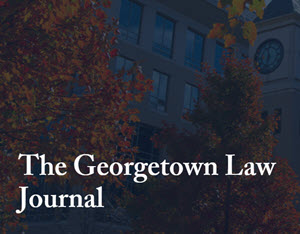Become a Patreon!
Abstract
Excerpted From: Georgetown University and The Georgetown Law Journal, VI. Prisoners' Rights, 49 Georgetown Law Journal Annual Review of Criminal Procedure 1155 (2020) (114 Footnotes) (Full Document)
 Criminal convictions and lawful imprisonment allow for certain limitations on citizens' freedoms and other constitutional rights, but prisoners retain such rights when they are compatible with the objectives of incarceration. Federal courts are reluctant to intervene in internal prison administration and therefore give broad deference to the judgment of prison officials. A prison regulation that infringes on a prisoner's constitutional rights must be "reasonably related to legitimate penological interests." Several factors are relevant in determining whether a regulation is reasonable: (1) whether a "valid, rational connection" exists between the regulation and the legitimate interest that would be advanced by its enactment; (2) whether alternative means of exercising the asserted right would remain available; (3) whether accommodation of the asserted right would adversely affect guards, other inmates, or the allocation of prison resources; and (4) whether an obvious, less burdensome alternative to the regulation exists.
Criminal convictions and lawful imprisonment allow for certain limitations on citizens' freedoms and other constitutional rights, but prisoners retain such rights when they are compatible with the objectives of incarceration. Federal courts are reluctant to intervene in internal prison administration and therefore give broad deference to the judgment of prison officials. A prison regulation that infringes on a prisoner's constitutional rights must be "reasonably related to legitimate penological interests." Several factors are relevant in determining whether a regulation is reasonable: (1) whether a "valid, rational connection" exists between the regulation and the legitimate interest that would be advanced by its enactment; (2) whether alternative means of exercising the asserted right would remain available; (3) whether accommodation of the asserted right would adversely affect guards, other inmates, or the allocation of prison resources; and (4) whether an obvious, less burdensome alternative to the regulation exists.


